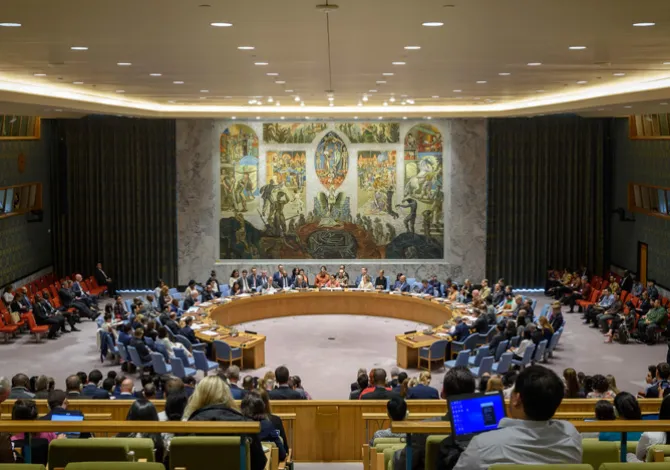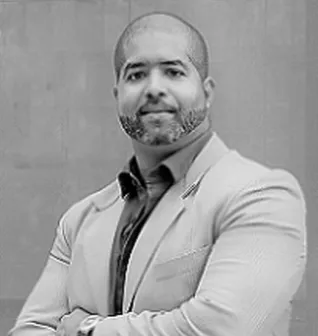
It is now apparent with respect to the seemingly intractable Gaza and Ukraine wars, whose wider effects reverberate, not only regionally but also internationally, the bill for the slow rolling of United Nations Security Council (UNSC) reform has come due. These conflicts, which raise the ante in terms of global insecurity, have virtually sidelined the UNSC. It has just experienced yet another institutional setback. In recent days, a resolution aimed at dialling back hostilities in respect of the Gaza war was scuttled, exposing the extent of the dysfunction therein. (For the first time since the outbreak of those hostilities, the Council only backed a resolution accordingly on 15 November 2023.)
This as the world is in the throes of a multipolar international order in the making; a geopolitical variable that, among a confluence of other variables, is increasingly foreclosing the UNSC P5's impetus to consistently accord with the Council's mission. It is also the clearest signal yet that the UNSC is being set up to pay a price for the resultant forfeit of great-power engagement, which has seemingly gone the way of the dinosaur.
A geopolitical variable that, among a confluence of other variables, is increasingly foreclosing the UNSC P5's impetus to consistently accord with the Council's mission.
It is high time for traditional Security Council power brokers realise that for this premier UN organ to step into the future, the ongoing Intergovernmental Negotiations (IGN)[i] process must meaningfully take on board key asks of the L69 group of countries—a grouping that includes countries from Africa, Latin America, Caribbean, Pacific Island states and Asia—as follows:
- Expansion of the Council, both permanent and non-permanent categories of membership, because this will lend to the body's representativeness, legitimacy, and effectiveness. (The matter of a rotating SIDS-related seat has also been raised.)
- Enhanced role, along with presence, of developing countries in the Council, which is linked to ensuring equitable geographical representation, especially as it pertains to under-represented and unrepresented regions and groups. (This is in connection with both categories of Council membership.)
- In principle, the IGN process ought to approach associated talks from the vantage point of text-based negotiations vis-à-vis a single consolidated text—in keeping with a fixed timeframe.
Broadly, UNSC reform is taken up with the following five-fold issues:
- Membership-related categories;
- The veto that the P5 members hold;
- Regional representation;
- What an enlarged Security Council engenders on account of size, not least regarding its working methods; and
- The relationship between the UNSC and UN General Assembly (UNGA).
The 14 sovereign SIDS of the Caribbean Community (CARICOM) bloc, comprising mostly Anglophone members who gained independence from the 1960s to the 1980s (and which share common foreign policy interests/challenges), have a sizeable stake in UNSC. This is the case because the Council is central to their collective security strategy. (What is more, any dysfunction in that body undercuts their own defence capabilities). A recent example is the UNSC's authorisation, in October 2023, of a landmark international security mission for Haiti—one of CARICOM's two non-Anglophone members—with a view to helping its “national police quell surging gang violence and restore security across the strife-torn Caribbean nation.” In October 2022, Haitian authorities first appealed to the international community for assistance in the restoration of security, as well as in the alleviation of the humanitarian crisis that has beset the embattled country. The UNSC's requisite follow through took a while to bear fruit and, in the interim, the conditions in-country worsened.
CARICOM member states record of close involvement in processes intended to move the needle vis-à-vis rejigging the Council must also be seen in the context of their active engagement in the affairs of this UN organ.
Moreover, and by way of yet another example, CARICOM member states deem the UNSC as vitally important in beating back hard power-related action that undermines the Caribbean as a zone of peace, which Venezuela's Guyana-related adventurism threatens to do. In this context and more, from the prism of its much-anticipated reform, they have a lot riding on the UNSC being up to the task in line with a consequential UNGA resolution titled 'Protection and security of small States' that inter alias
Calls upon the Security Council and other relevant organs of the United Nations to pay special attention to the protection and security of small States in the restructuring and revitalization of the work of the United Nations, especially within the context of the Special Committee on the Charter of the United Nations and on the Strengthening of the Role of the Organization and in the follow-up activities of the report of the Secretary-General of 17 June 1992 entitled "An Agenda for Peace." (emphasis added)
CARICOM member states record of close involvement in processes[ii] intended to move the needle vis-à-vis rejigging the Council must also be seen in the context of their active engagement in the affairs of this UN organ. A case in point is St. Vincent and the Grenadines, one of just a handful of CARICOM member states which have served as P10 elected UNSC members. It has left its mark and led on such ‘big ticket’ Council reform issues as representativeness, not least by being instrumental in the advent of and placing itself firmly behind what is considered to be the most important development in the Council's recent history: The diplomatically innovative 'A3 Plus One Mechanism'.
In coming into being, this mechanism has enabled formalised coordination and collaboration between St. Vincent the Grenadines and African countries on the UNSC. Beginning in 2024, Guyana will take up that mantle vis-à-vis its two-year tenure on the Security Council. (Essentially, owing to this initiative, Africa is afforded yet another seat on the UNSC.)
Such a diplomatic stance goes hand in glove with a cardinal principle of CARICOM member states' foreign policymaking: They will fare best at confronting security threats if they, too, are in the diplomatic driver's seat regarding advancing associated solutions. This thinking has led to St. Vincent the Grenadines, for example, at this moment, leveraging its Pro Tempore Presidency of the Community of Latin American and the Caribbean States (CELAC) for the period 2023 in the service of high-level diplomacy on the Guyana-Venezuela border controversy.
Notably, principally addressed to his Guyanese and Venezuelan counterparts, a 9th December letter from Vincentian Prime Minister Ralph Gonsalves calls attention to a presidential meeting that will be held in St. Vincent the Grenadines on 14 December. It is convened under the auspices of CELAC and CARICOM, with a view to focusing on matters consequential to the border controversy between Guyana and Venezuela.
This comes against a backdrop of the latter party having flouted the International Court of Justice's (ICJ) decision, handed down on 1 December, which states that both sides in the said controversy should refrain from taking any action that changes the status quo in the territory in question. Caracas' sabre-rattling compelled Georgetown to take up the matter at the UNSC, with—to quote Prime Minister Gonsalves—“recent events and circumstances attendant upon the border controversy” occupying the attention of CARICOM Heads of Government at a recently held virtual meeting.
In establishing the UN, nearly 80 years ago, fitting of the moment, on paper, the international community put the anarchic global system on an international peace and security footing.
In short, Guyana and, by extension, CARICOM are currently confronted by a live security-related threat to sovereignty and territorial integrity or political independence, emanating from Venezuela. With regard to its territorial claim of the Essequibo, Caracas is now menacing anew. Georgetown sought immediate relief from the ICJ, which is presiding over the case of the Guyana-Venezuela border controversy, even as the UN has traditionally kept tabs on the matter.
All told, the reality of the relatively small size of the respective CARICOM countries—which are no match for large(r) counterparts—makes an effective UNSC the paramount issue in their (collective) security strategy.
In conclusion, in establishing the UN, nearly 80 years ago, fitting of the moment, on paper, the international community put the anarchic global system on an international peace and security footing. Although that intent came into sharp focus at the time, gradually, this historic experiment in multilateralism has been subjected to the test of states' predisposition “towards conflict and competition.” If there is a single reason for this behaviour, according to the realist school of thought in the discipline of International Relations, it is states' preoccupation with (the search for) security. This needs to be said, if only because (in)security is the prism through which small and large states alike view international politics; the first set is no less than the second.
It follows that, in respect of their principal security blanket, a dysfunctional UNSC augurs ill for CARICOM member states; possibly, they could end up ceding diplomatic and/or political ground qua leverage to would-be aggressors. (There is little for these states to gain from—to paraphrase the late former UN Secretary-General Kofi Annan—going all in with diplomacy in interstate relations, absent the means of appropriate recourse to the UNSC's “firmness and force” in a bid to amplify its effects.) After all, they are reliant on the Security Council upholding legitimacy, effectiveness and an unwavering commitment to implement its decisions.
Paying lip service, then, to UNSC reform is a nonstarter. From CARICOM member states' perspective, having regard to the foregoing analysis, to do so is to gamble on their future.
In one of history's great ironies, then, a Council that was fashioned by Allied powers' statesmen of the day is a lifeline for some of the contemporary international system's smallest states. For CARICOM, a Security Council that is fit for purpose is best able and suited to serve its security interests, which can only really be upheld through third parties at that level; given its membership's size-related constraints.
Instructively, as regards UNSC reform, CARICOM supports only one model: Expansion in both categories. Consequentially, in this vein, representativeness is the key to transformation at the level of the Council and systemically. This resonates with post‐colonial states, like those of CARICOM. For such states, as it is currently configured, the UNSC is a vestige and reminder of the imperialist past. Some would say it is a 'relic' of a bygone era. Indeed, its composition “no longer reflects global geopolitical realities.”
Paying lip service, then, to UNSC reform is a nonstarter. From CARICOM member states' perspective, having regard to the foregoing analysis, to do so is to gamble on their future. Finally, doing so would also be revealing of the fact that there are some who are less determined to take seriously the UNSC's guardianship of the UN Charter. This is self-defeating, considering the UN Charter is principally taken up with buttressing international peace and security, precisely because the anarchic global system is hardwired to do otherwise.
Nand C. Bardouille is Manager of The Diplomatic Academy of the Caribbean in the Institute of International Relations (IIR), The University of the West Indies (The UWI), St. Augustine Campus, Trinidad and Tobago.
[i] i.e. Intergovernmental Negotiations on the question of equitable representation on and increase in the membership of the Security Council and other related matters to the Security Council, or IGN.
[ii] For a useful online resource that contextualizes and traces the evolution of the IGN over a 25 year period, please refer to Handbook on Security Council Reform: 25 Years of Deliberations. The L69 is behind this resource document, which was published in 2018.
The views expressed above belong to the author(s). ORF research and analyses now available on Telegram! Click here to access our curated content — blogs, longforms and interviews.




 PREV
PREV


